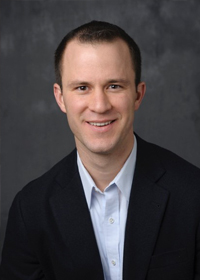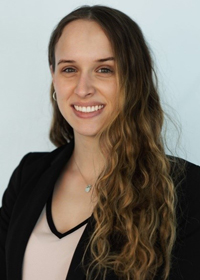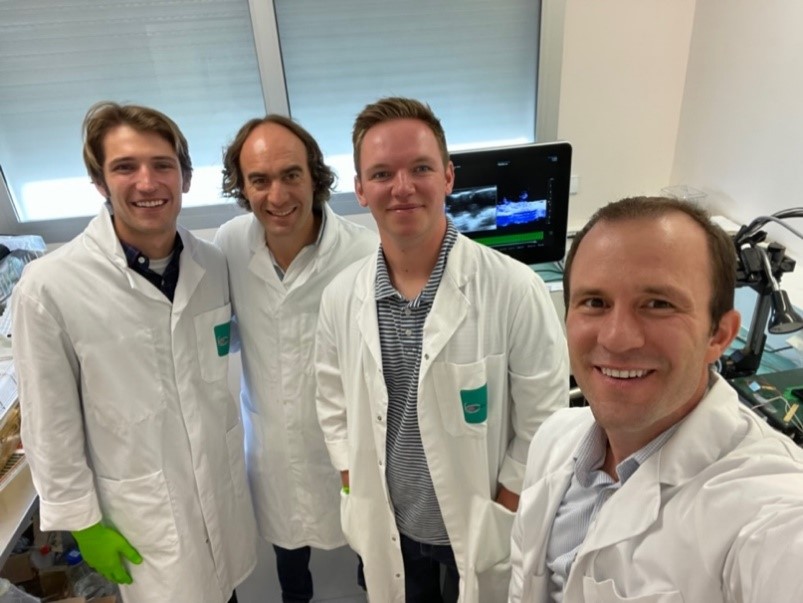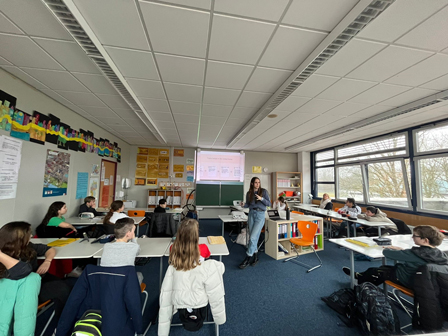Fulbright Chronicles, Volume 2, Number 2 (2023)
Author
Katherine E. Kerr and Craig J. Goergen
Abstract


International biomedical research collaborations are incredibly fruitful endeavors that can be enhanced by the inclusion of students and trainees. Our experiences in France and Germany demonstrated that participation of young researchers in Fulbright projects focused in the field of biomedical engineering can boost academic productivity, cultural understanding, and community exchange. Mentees also benefit in numerous ways from the in-person experiences associated with international partnerships. Future Fulbright-supported researchers would benefit from including students and trainees in their international collaborations.
Keywords
biomedical research • student-led projects • France • Germany • global pandemic
The Benefit of Incorporating Students in Research
A frequently overlooked component of research including international collaborations is the benefit
of incorporating students in projects.
Many Fulbright participants, both as scholars and students, have had enriching experiences that spurred joint projects, increased cultural exchange, and helped address pressing global challenges. However, a frequently overlooked component of research collaborations, including international collaborations, is the benefit of incorporating students in projects. Early career and trainee researchers can be a key link between two different research groups, especially for in-person projects. Here we describe two international Biomedical research experiences supported by the Fulbright France US Scholar Program (Dr. Craig GOERGEN to Montpellier) and the Fulbright Germany US Student Program (Katherine KERR to Frankfurt). While the experiences differed in some ways, the opportunity to have students connect with several different laboratories was instrumental to the success of projects related to traumatic brain injury, cardiac remodeling, and aortic dissection.
Collaboration with Montpellier, France
Craig is a professor of Biomedical Engineering at Purdue University in West Lafayette, Indiana, United States (US). He leads a research group that uses advanced, noninvasive imaging techniques to study cardiovascular disease in rodent models. Through a mutual contact, he connected with a research group in Montpellier, France, led by Dr. Pierre Sicard who has shared research interests. Through the support of the US Scholar Program, Craig was able to work in France for five months in early 2022 with his wife and two young children. While it was an amazing experience for him and his family, the research projects were a success mostly due to the efforts of Purdue students, John Salvas and Luke Schepers, who were able to travel with him and assist with laboratory experiments and data analysis. Indeed, the many administrative requirements of academic faculty can be distracting and potentially delay progress when a project is PI-driven. Fortunately, the trainees Craig worked with were creative, motivated, and innovative, thus the student-driven efforts in both France and the US progressed smoothly and led to multiple publications (Note 1).

Collaboration with Frankfurt, Germany
Katherine began working as an undergraduate research assistant in Craig’s laboratory at Purdue University in August 2018. Having always been interested in international cultural exchange through research, Katherine reached out to Craig about her goals during her third year in college, which happened to be 2020. Like many students, the Covid-19 pandemic made the experience of an undergraduate study abroad unlikely for Katherine. At the same time, the pandemic helped drive virtual collaborations, expanding opportunities internationally. Katherine was able to meet virtually with a research group at Frankfurt University of Applied Sciences led by Dr. Christopher Blase and Dr. Andreas Wittek and plan an in-person project through a previous relationship Craig had developed from conferences over the years. Although the pandemic accelerated the development of infrastructure to enable more effective international virtual communication, Katherine wanted to pursue a Fulbright fellowship to work with the group and experience research in-person abroad. During her time in Germany, Katherine investigated markers for non-invasively predicting biomechanical properties of the aorta in vivo. She evaluated patient 4D ultrasound images to assess elasticity and strength of the aortic wall. Her experiences were varied, enriching, and memorable – both from research and cultural perspectives.
Effects of the Pandemic
The pandemic required an unprecedented amount of flexibility and patience from Craig, Katherine, and their international hosts. Hybrid work provided a way to work effectively while following Covid-19 restrictions on social distancing, vaccinations, and travel, especially internationally. This was especially valuable when initially establishing these international research collaborations, as video calls with large groups and online data sharing became more common place. Further, Craig’s start date was repeatedly postponed as case counts continually rose and fell, making it difficult to plan travel and housing. Despite the challenges, the Fulbright program was incredibly accommodating and worked with Craig and his family to accommodate these delays. Although Katherine’s Fulbright experience was at the tail end of the pandemic, she still had to account for travel restrictions, vaccine requirements, and masking policies when travelling overseas. The Fulbright Commission was flexible regarding travel dates, provided current information about the latest travel advisories, and held pre-departure orientations to assist with logistics prior to arrival. Additionally, the handbook and the alumni network provided by Fulbright was especially useful for tips on adjusting to life abroad.
Virtual and In-Person Research Collaborations
Although virtual work has improved remote collaborative efforts, in-person strategic connections are beneficial for biomedical research, especially for trainees early in their careers. While working in the Goergen Laboratory before the Covid-19 pandemic, Katherine found in-person conversations with more senior laboratory members about animal training, and imaging experiments to be paramount to her learning. Once the pandemic began, Katherine found it difficult to have the same meaningful exchanges virtually. Additionally, transitioning to a German institution with different cultural norms and systems was a challenge from a student perspective. For example, Katherine found that the bureaucratic process both takes longer and typically requires more paperwork than in the US. This can be especially difficult when all of these processes are not in English, as even small language barriers can make describing technical specifics challenging. Additionally, Katherine was ultimately unable to use an ultrasound imaging system located within a hospital in Frankfurt because of access limitations to clinical spaces during the pandemic. Similarly, Craig enjoyed working with a talented and diverse team in Montpellier, but virtual and hybrid work schedules meant he occasionally found it difficult to connect in-person with others on campus. While this did not ultimately interfere with research progress, it was a challenge when initially developing personal relationships. Although both Katherine and Craig found general research practices to be fairly standard, it was always helpful to keep in mind cultural differences when working with a diverse team. For example, Craig would make an effort to always begin conversations with “Bonjour” and Katherine turned to fellow graduate students for help filling in any gaps in communication.
While our international project planning and early discussions benefited from the normalization of virtual work due to the Covid-19 pandemic, being able to work in the laboratory can clearly enhance a trainee’s experience. Daily interactions in the laboratory can lead to intellectual and cultural exchange in ways that would not be possible in an exclusively virtual environment. It is easier to discuss ideas with other students and get involved in side-projects, which can be difficult to do when working remotely. As a student, Katherine was able to engage organically with both the graduate and undergraduate student communities, sharing experiences about research, perceptions, stereotypes, and more. As a faculty member, Craig found it easier to have conversations in-person with several research groups in Montpellier about mutual research interests, data analysis strategies, and funding proposals.
Community Engagement
In addition to academic engagements, both Craig and Katherine were able to engage with the local community. For example, Katherine was able to participate in the MeetUS program through Fulbright and the US Consulate in Germany. Katherine visited approximately 20 different German classrooms, talking to over three hundred students. Not only was she able to share her experience as an American and answer students’ questions, she also got enlightened about German perceptions of Americans from a different point of view. When she would return to the laboratory after visiting a school, Katherine would often share interesting questions the students asked with her coworkers. Student questions ranged from the composition of a typical daily American diet, to the experience of being an American high school student, to the nuances of American politics. These questions often prompted further discussions about cultural differences, giving Katherine more insight into the German school experience. Talking with German middle school and high school students, graduate students, and even professors, provided an interesting range of perspectives.

Craig had a similar opportunity to interact with French families that had children in the international elementary school that his son and daughter attended. The teachers, parents, and other students at the school were initially somewhat curious about the American 4- and 7-year-olds that joined mid-way through the year, but within just a few weeks, both had integrated into the daily routine and were making friends from countries all over the world. This international school connection also gave Craig insight into the French family life he did not observe directly in the laboratory. For example, French culture, customs, and language are very apparent at 8-year-old birthday parties, early morning drop-offs, and school performances. Overall, both Katherine and Craig learned nearly as much through cultural exchange as they did through their research projects.
Benefits of In-Person Collaboration
As peak pandemic-era restrictions begin to lift, in-person collaborations and experiences have once again become possible. Although the pandemic vastly improved virtual collaborations, community engagement and everyday exchanges that lead to enhanced cultural understanding are difficult to replicate without in-person interaction. Additionally, these in-person collaborations can lay the framework for long-term research collaborations. In student communities, the daily interactions between co-workers can turn into potential future co-authors. For example, Katherine was able to assist in proofreading and provide insight on data collected in Indiana during her time in Frankfurt. Although her own research focuses on blood vessels, she learned about a variety of topics and different data collection techniques through conversations with her coworkers. Similarly, efforts by Craig, John, and collaborators in Montpellier led to publications describing heart changes after traumatic brain injury (see Note #1) and what happens to brain tissue oxygenation after cardiac arrest (see Note #2). Both Katherine and Craig have plans to continue these collaborations in the future and are exploring options for additional collaborative projects.
New Perspectives and Cultural Experiences
The Fulbright experience provided Katherine and Craig with new perspectives on scientific research, education, and European culture. For example, Katherine enjoyed having a first-hand experience observing components of the German educational system. Her work in local schools changed her view on styles of learning, as she had only been previously exposed to the American system. Given that science and physics are relatively universal, the teaching methods in Germany are fairly similar to those in the United States. However, there are some key differences. Katherine found the professor-student relationship at the university level to be more formal in German classes compared to classes in the United States. Additionally, the grading system, degree options, and testing philosophies all differ when comparing educational programs between the United States and Germany. For example, public school system in the United States typically expect students to attend the same high school through year 12. Conversely, the German system offers students the opportunity to attend different schools for varying amounts of time, providing additional flexibility depending on the student’s interests and career plans. Furthermore, in Katherine’s experience, there is a huge priority placed on the final examination in Germany, while in the United States, students are evaluated in many different formats and assignments beyond a final exam. Overall, the opportunities to observe and participate in both educational systems have provided Katherine with a better understanding of the differences between German and American education, lifestyles, and culture.
During his five months in Montpellier, Craig had a chance to interact with co-workers from a variety of countries and backgrounds (i.e. Brazil, Italy, Morocco, Thailand, and the United Kingdom). While many universities have large international populations of students, staff, and faculty, the environment in Montpellier was both welcoming and yet, distinctively French. Lunches were always more than an hour and eating at your desk was actively discouraged. The copious amount of espresso machines made coffee drinking both easy and ubiquitous. And while formal scientific communication is typically in English, it was helpful to be reminded that there are certain difficulties associated when using second language. Having that perspective is helpful when interacting with international collaborators who are not as confident when speaking and writing in English. Both Katherine and Craig observed that much of the informal communication in laboratory occurred in native languages, meaning it was beneficial for both of them to learn enough French or German to follow along. Becoming truly fluent in a secondary language is a challenge, but making an effort and getting over the fear of making mistakes can go a long way to bridge the cultural divide.
Enduring Impact
Craig is continuing his collaboration with several research groups at Université de Montpellier. He has already traveled back twice to France over the past twelve months and was able to host Dr. Sicard in October 2022 and April 2023. Having the opportunity to experience American Halloween with Pierre and his family was a special experience, especially with the costumes, candy, and interactions with neighbors. Additionally, two PhD students from Craig’s lab were awarded Chateaubriand Fellowships, a grant offered by the Embassy of France in the United States to support “outstanding PhD students from US institutions who wish to conduct part of their doctoral research in France” with fellowship ranging from 4 to 9 months (see Note #3). The ability to conduct part of their graduate research in Montpellier has meant new collaborations have begun and the students can take advantage of strengths from both institutions.
Katherine is strongly considering postdoctoral training in Germany when she completes her PhD research. As a student researcher, she has gained confidence through her Fulbright experience and connected with a large network of German researchers. Her improved language skills have also helped spur these interactions and she has identified several groups she may be interested in receiving training. If Katherine decides to pursue an academic position, she would certainly be open to cross-cultural collaborations, hosting students, and traveling internationally again as a Fulbright Scholar. The collaborative research between Frankfurt and Purdue has led to one journal article currently in review and two conference presentations, one of which in May 2023 allowed our collaborators from Montpellier and Frankfurt to meet in-person in Paris, France. None of this work would be ready to present if it was not for students like Katherine, John, Luke, and many others who made it possible.
Conclusion
In summary, inclusion of students in Fulbright-supported research collaborations is an effective way to assist in making international efforts successful and aid in student’s professional development. Katherine was instrumental in bridging cultural gaps and sharing a unique perspective on top of the research she performed during her Fulbright experience. Likewise, the work that Craig helped lead was made possible by inclusion of several US students that were vital to experiments, data analysis, and manuscript preparation. Future scholars and researchers should consider including students and trainees on projects as they can have a positive impact when establishing and conducting international collaborative research.
Notes
- To learn more about the study linking cardiovascular changes to mild traumatic brain injury in juvenile mice, see this 2023 publication (Leyba et al., Acta Physiologica, 2023 January, doi: 10.1111/apha.13933).
- For more information about the study reporting on physiologic changes after cardiac arrest and resuscitation in a murine model, see this 2023 publication (Salvas et al., IEEE Transactions on Ultrasonics, Ferroelectrics, and Frequency Control. 2023 April, doi: 10.1109/TUFFC.2023.3265800).
- Additional information about the Chateaubriand Fellowship Program can be found on their website: https://www.chateaubriand-fellowship.org/. (Accessed June 9th, 2023).
Biography
Katherine E. Kerr is currently a PhD student at the University of Pittsburgh and former Fulbright student grantee to Germany. She can be contacted at kak488@pitt.edu.
Craig J. Goergen is the Leslie A. Geddes Professor of Biomedical Engineering at Purdue University and is a former Fulbright US Scholar to France. He can be contacted at cgoergen@purdue.edu
